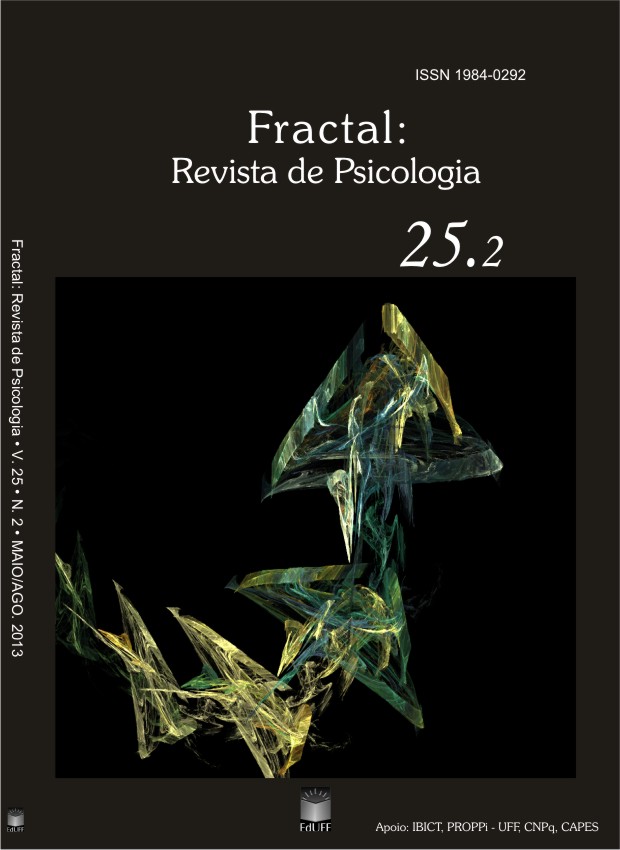O problema da análise em pesquisa cartográfica
Palabras clave:
metodologia, análise de dados, pesquisa-intervençãoResumen
Este artigo aborda o papel da análise em uma pesquisa de abordagem cartográfica. Ao equivocar a noção de “dado”, entendemos que a análise em cartografia leva a uma redefinição das fronteiras entre subjetividade e objetividade. A análise em cartografia está afinada a outras abordagens de pesquisa e intervenção, assumindo diferentes procedimentos que permitem a análise de implicação na pesquisa e, por conseguinte, a análise da participação. Como efeito da análise, há o reposicionamento do lugar dos participantes na pesquisa. A análise em cartografia permite, ao longo de toda a realização da pesquisa, o acesso a uma objetividade que, em lugar de fixar um sentido unívoco, tende a proliferar sentidos. A cartografia afirma tal paradoxo por meio de uma atitude analítica, agente de singularização.
Descargas
Citas
ALVAREZ, J.; PASSOS, E. Cartografar é habitar um território existencial. In: PASSOS, E.; KASTRUP, V.; ESCÓSSIA, L. da (Org.). Pistas do método da cartografia: pesquisa intervenção e produção de subjetividade. Porto Alegre: Sulina, 2009. p. 131-149.
BARDIN, L. Análise de conteúdo. Lisboa: Ed. 70, 2010.
BENEVIDES DE BARROS, R.; PASSOS, E. Clínica, política e as modulações do capitalismo. In: Revista Lugar Comum, Rio de Janeiro, n. 19-20, p. 159-171, jan.-jun. 2004.
BERGSON, H. O pensamento e o movente (Introdução). In: Os pensadores: Bergson e Bachelard. São Paulo: Abril Cultural, 1974.
DEPRAZ, N.; VARELA, F.; VERMERSCH, P. On becoming aware: a pragmatic of experiencing. Philadelphia-Amsterdam: Benjamin, 2003.
DEPRAZ, N.; VARELA, F.; VERMERSCH, P.; A redução à prova da experiência. Arquivos Brasileiros de Psicologia, Rio de Janeiro, v. 58, n. 1, 2006. Disponível em: <http://pepsic.bvsalud.org/scielo.php?pid=S1809-52672006000100008&script=sci_arttext>. Acesso em: 03 maio 2013.
DESPRET, V. Ethology between Empathy, Standpoint and Perspectivism: the case of the Arabian babblers. 2010. Disponível em: <http://www.vincianedespret.be/2010/04/ethology-between-empathy-standpoint-and-perspectivism-the-case-of-the-arabian-babblers/#more->. Acesso: 13 jan. 2013.
DESPRET, V. O que as ciências da etologia e da primatologia nos ensinam sobre as práticas científicas? Fractal: Revista de Psicologia, Niterói, v. 23, n. 1, p. 59-72, jan./abr. 2011.
EIRADO, A. et al. Estratégias de pesquisa no estudo da cognição: o caso das falsas lembranças. Psicologia & Sociedade, v. 22, n. 1, p. 84-94, 2010.
FOUCAULT, M. Vigiar e Punir. Petrópolis: Vozes, 2003a.
FOUCAULT, M. A Poeira e a Nuvem (1980). In: MOTTA, M. B. (Org.). Estratégia, Poder-Saber. Rio de Janeiro: Forense Universitária, 2003b. Coleção Ditos & Escritos, v. 4, p. 323-334.
FOUCAULT, M. Mesa-redonda em 20 de maio de 1978. In: MOTTA, M. B. (Org.). Estratégia, Poder-Saber. Rio de Janeiro: Forense Universitária, 2003c. Coleção Ditos & Escritos, v. 4, p. 334-351.
LOURAU, R. Analista em tempo integral. ALTOÉ, S. (Org.). São Paulo: Hucitec, 2004
LATOUR, B. Como falar do corpo? A dimensão normativa dos estudos em ciência. In: NUNES, J. A.; ROQUE, R. (Org.). Objetos impuros: experiências em estudos sociais da ciência. Porto: Afrontamento, 2007. p. 40-61.
MATURANA, H.; VARELA, F. A Árvore do Conhecimento. São Paulo: Palas Athena, 2005.
PASSOS, E.; BENEVIDES DE BARROS, R. A cartografia como método de pesquisa-intervenção. In: PASSOS, E.; KASTRUP, V.; ESCÓSSIA, L. (Org.). Pistas do método da cartografia: pesquisa intervenção e produção de subjetividade. Porto Alegre: Sulina, 2009. p. 17-31.
PASSOS, E.; EIRADO, A. Cartografia como dissolução do ponto de vista do observador. In: PASSOS, E.; KASTRUP, V.; ESCÓSSIA, L. (Org.). Pistas do método da cartografia: pesquisa intervenção e produção de subjetividade. Porto Alegre: Sulina, 2009. p. 109-130.
POZZANA, L.; KASTRUP, V. Cartografar é acompanhar processos. In. PASSOS, E.; KASTRUP, V.; ESCÓSSIA, L. da (Org.). Pistas do método da cartografia: pesquisa intervenção e produção de subjetividade. Porto Alegre: Sulina, 2009. p. 52-75.
RODRIGUES, H. C. de B. Analisar. In: FONSECA, T.; NASCIMENTO, L.; MARASCHIN, C. (Org.). Pesquisar na diferença. Porto Alegre: Sulina, 2012.
SIMONDON, G. L’Individuation psychique et collective. Paris: Aubier, 1969.
VARELA, F. Conhecer: as ciências cognitivas tendências e perspectivas. Lisboa: Instituto Piaget, 1988.
VARELA, F.; THOMPSON, E.; ROSCH, E. A mente incorporada: ciências cognitivas e experiência humana. Porto Alegre: ARTMED, 2003.
WAHL, J. Vers le Concret. Paris: Vrin, 1932.
WHITEHEAD, A. N. A ciência e o mundo moderno. São Paulo: Paulus, 2006.
##submission.downloads##
Publicado
Cómo citar
Número
Sección
Licencia
Autores que publicam nesta revista concordam com os seguintes termos:
- Autores mantém os direitos autorais e concedem à revista o direito de primeira publicação, com o trabalho simultaneamente licenciado sob a Creative Commons Attribution License que permitindo o compartilhamento do trabalho com reconhecimento da autoria do trabalho e publicação inicial nesta revista.
- Autores têm autorização para assumir contratos adicionais separadamente, para distribuição não-exclusiva da versão do trabalho publicada nesta revista (ex.: publicar em repositório institucional ou como capítulo de livro), com reconhecimento de autoria e publicação inicial nesta revista.

This work is licensed under a Creative Commons Attribution 4.0 International License.

Na medida do possível segundo a lei, a Fractal: Revista de Psicologia renunciou a todos os direitos autorais e direitos conexos às Listas de referência em artigos de pesquisa. Este trabalho é publicado em: Brasil.
To the extent possible under law, Fractal: Revista de Psicologia has waived all copyright and related or neighboring rights to Reference lists in research articles. This work is published from: Brasil.






